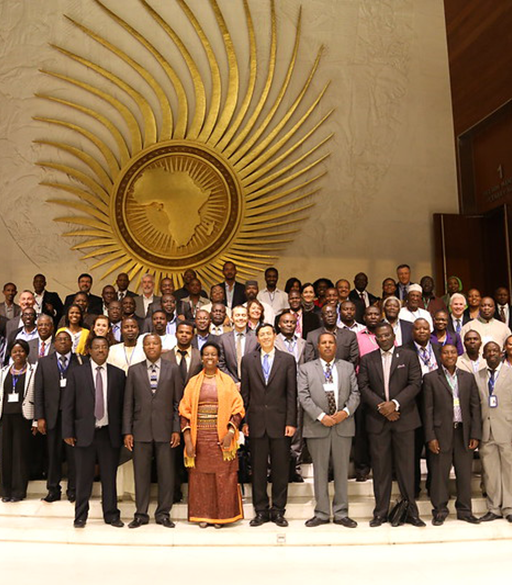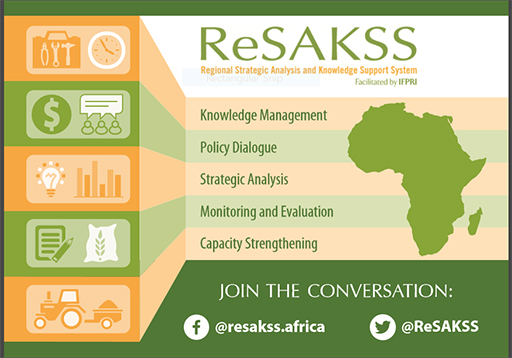Our History

AKADEMIYA2063 was established to continue and expand the portfolio of policy research and capacity-strengthening support for the implementation of the Comprehensive Africa Agriculture Development Programme (CAADP), which was initiated and previously incubated by the International Food Policy Research Institute (IFPRI). This portfolio has included three main programs: the Regional Strategic Analysis and Knowledge Support System (ReSAKSS), the African Growth and Development Policy (AGRODEP) Modeling Consortium, and the Malabo Montpellier Panel (MaMo Panel). These programs aim in different ways to strengthen knowledge systems, promote evidence-based policymaking, and contribute to agricultural and economic development, and ultimately, to the achievement of the aspirations of the African Union’s Agenda 2063.
ReSAKSS was established in 2006 in partnership with the African Union Commission (AUC), the NEPAD Secretariat and leading regional economic communities: the Common Market for Eastern and Southern Africa (COMESA); the Economic Community of West African States (ECOWAS) and the Southern African Development Community (SADC). IFPRI set up collaboration with other Africa-based CGIAR centers – the International Institute for Tropical Agriculture (IITA), the International Livestock Research Institute (ILRI) and the International Water Management Institute (IWMI) – to host the ReSAKSS teams in their respective regions. The role of ReSAKSS is twofold: (i) to provide policy-relevant analysis, data, and tools to support the formulation and implementation of evidence-based agricultural sector policies and strategies; and (ii) to build capacities and create knowledge products and platforms to foster mutual accountability in the food and agricultural sector through enhanced policy dialogue, peer review, benchmarking, and learning processes. ReSAKSS has played a key role in advancing mutual accountability processes in Africa by helping to strengthen national agricultural review processes and establishing implementation modalities for the continental Biennial Review, in setting up country Strategic Analysis and Knowledge Support Systems, and in disseminating data and knowledge products to monitor CAADP implementation to agricultural sector stakeholders.

The AGRODEP Modeling Consortium was created in 2010 by IFPRI in partnership with African sub-regional research organizations. AGRODEP is enabling a critical mass of world-class modelers across Africa, currently over 230 from 36 countries, to take a leading role in addressing strategic development issues across the continent, including helping meet the analytical needs of the CAADP implementation agenda. AGRODEP promotes the use of advanced economic modeling tools, facilitates access to data sources, provides training and research grants, and supports collaboration between African and international researchers. Since its establishment, AGRODEP has gained recognition as a leading network of African experts. AGRODEP members have been solicited to join efforts to assess progress under the African Continental Free Trade Area, support the design of evidence-based National Agriculture Investment Plans, and assess the impact of continental initiatives such as the New Alliance for Food Security and Nutrition, among others.
The Malabo Montpellier Panel, established in 2016 by IFPRI, the University of Bonn, and Imperial College London, is the last of the three major programs in support of the CAADP agenda. It regroups 18 leading African and non-African experts in agriculture, ecology, nutrition, and food security. Its goal is to encourage the development of impactful policy innovations by African governments in order to accelerate progress toward food security and improved nutrition. The Panel identifies and analyzes successful institutional, policy and programmatic innovations by countries that have made the most progress towards various key Malabo targets. The related Malabo Montpellier Forum facilitates exchange among high-level policymakers to encourage their scaling up and replication. The good practices identified in the Panel’s reports and discussed with policymakers at the Forum have led several countries to institute new initiatives incorporating lessons from other countries’ experiences.

Building African capacity and institutions has been a long-term goal of the AUC, IFPRI, and development partners. From the outset, the ultimate objective was to transfer and institutionalize the ReSAKSS, AGRODEP and MaMo Panel programs within an Africa-based organization. The migration of the programs from IFPRI was scheduled to take place in the second phase of the ReSAKSS project, which ended in 2015. A transition roadmap and action plan were developed and agreed upon in 2009 by the 9th CAADP Partnership Platform participants for a transfer by 2013/2014. Ultimately, the transfer did not take place due to the preparation of the Malabo Declaration agenda, which did not allow enough time for AUC and the AUDA-NEPAD to implement the action plan. It was decided to migrate the programs during the third phase of ReSAKSS in the 2017-2021 period.
Accordingly, AKADEMIYA2063, a pan-African non-profit research organization with headquarters in Kigali, Rwanda and a regional office in Dakar, Senegal, was established in January 2020 to host ReSAKSS, AGRODEP and the Malabo Montpellier Panel. The migration of the programs was completed in July 2020. AKADEMIYA2063 works closely with the AUC, AUDA-NEPAD, regional economic communities, countries, and development partners and continues to collaborate with IFPRI to support the successful implementation of CAADP and the advancement of agricultural transformation and development in Africa.
